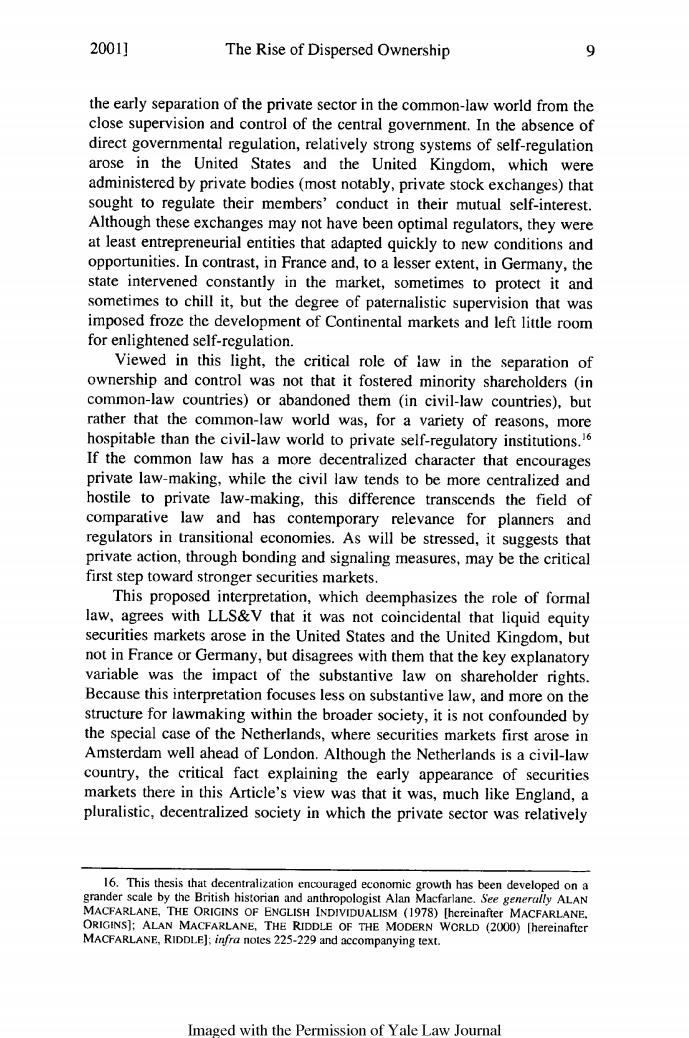正在加载图片...

2001 The Rise of Dispersed Ownership 9 the early separation of the private sector in the common-law world from the close supervision and control of the central government.In the absence of direct governmental regulation,relatively strong systems of self-regulation arose in the United States and the United Kingdom which were administered by private bodies(most notably,private stock exchanges)that sought to regulate their members'conduct in their mutual self-interest. Although these exchanges may not have been optimal regulators,they were at least entrepreneurial entities that adapted quickly to ne nditions and opportunities.Fran e and,to a lesser extent,in Germany,the state intervened constantly in the market,sometimes to protect it and sometimes to chill it,but the degree of paternalistic supervision that was imposed froze the development of Continental markets and left little room for enlightened self-r Viewed in this light,the critical role of law in the separation of ownership and control was not that it fostered minority sharcholders (in common-law countries)or abandoned them (in civil-law countries),but rather that the common-law world was,for a variety of reas mor spitable than the civil-law world to private self-regulatory institutions. the sommon a hasa more decentralized character that co private law-making,while the civil law tends to be more centralized and hostile to private law-making,this difference transcends the field of comparative law and has conte mporary relevance for planners and regulators in transitional economies.As will be stressed,it suggests that private action,through bonding and signaling measures,may be the critical first step toward stronger securities markets. This proposd which deemphasizes theo of forma law grees ith LLS&V that i not coincidental that liquid equity securities markets arose in the United States and the United Kingdom,but not in France or Germany,but disagrees with them that the key explanatory variable was the impact of the substantive law on shareholder right Because this interp tion fo es less on substantive law,and more on th structure for lawmaking within the broader society,it is not confounded by the special case of the Netherlands,where securities markets first arose in Amsterdam well ahead of London.Although the Netherlands is a civil-law the citic fact xp of markets there in this Article' pluralistic,decentralized society in which the private sector was relatively ORIGINS THE SH INDIVIDUALISM(1978)[her MACFARLAN Imaged with the permission of Yale law lournal The Rise of Dispersed Ownership the early separation of the private sector in the common-law world from the close supervision and control of the central government. In the absence of direct governmental regulation, relatively strong systems of self-regulation arose in the United States and the United Kingdom, which were administered by private bodies (most notably, private stock exchanges) that sought to regulate their members' conduct in their mutual self-interest. Although these exchanges may not have been optimal regulators, they were at least entrepreneurial entities that adapted quickly to new conditions and opportunities. In contrast, in France and, to a lesser extent, in Germany, the state intervened constantly in the market, sometimes to protect it and sometimes to chill it, but the degree of paternalistic supervision that was imposed froze the development of Continental markets and left little room for enlightened self-regulation. Viewed in this light, the critical role of law in the separation of ownership and control was not that it fostered minority shareholders (in common-law countries) or abandoned them (in civil-law countries), but rather that the common-law world was, for a variety of reasons, more hospitable than the civil-law world to private self-regulatory institutions. 6 If the common law has a more decentralized character that encourages private law-making, while the civil law tends to be more centralized and hostile to private law-making, this difference transcends the field of comparative law and has contemporary relevance for planners and regulators in transitional economies. As will be stressed, it suggests that private action, through bonding and signaling measures, may be the critical first step toward stronger securities markets. This proposed interpretation, which deemphasizes the role of formal law, agrees with LLS&V that it was not coincidental that liquid equity securities markets arose in the United States and the United Kingdom, but not in France or Germany, but disagrees with them that the key explanatory variable was the impact of the substantive law on shareholder rights. Because this interpretation focuses less on substantive law, and more on the structure for lawmaking within the broader society, it is not confounded by the special case of the Netherlands, where securities markets first arose in Amsterdam well ahead of London. Although the Netherlands is a civil-law country, the critical fact explaining the early appearance of securities markets there in this Article's view was that it was, much like England, a pluralistic, decentralized society in which the private sector was relatively 16. This thesis that decentralization encouraged economic growth has been developed on a grander scale by the British historian and anthropologist Alan Macfarlane. See generally ALAN MACFARLANE, THE ORIGINS OF ENGLISH INDIVIDUALISM (1978) [hereinafter MACFARLANE, ORIGINS]; ALAN MACFARLANE, THE RIDDLE OF THE MODERN WORLD (2000) [hereinafter MACFARLANE, RIDDLE]; infra notes 225-229 and accompanying text. Imaged with the Permission of Yale Law Journal 2001]